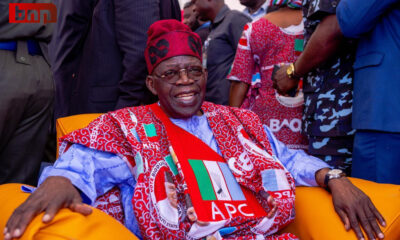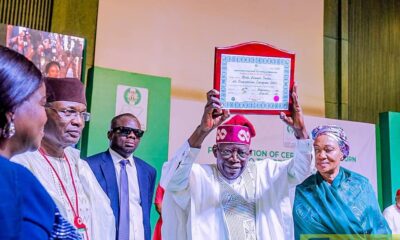Opinion
Post-Buhari: Will Tinubu bring back the marketing boards?
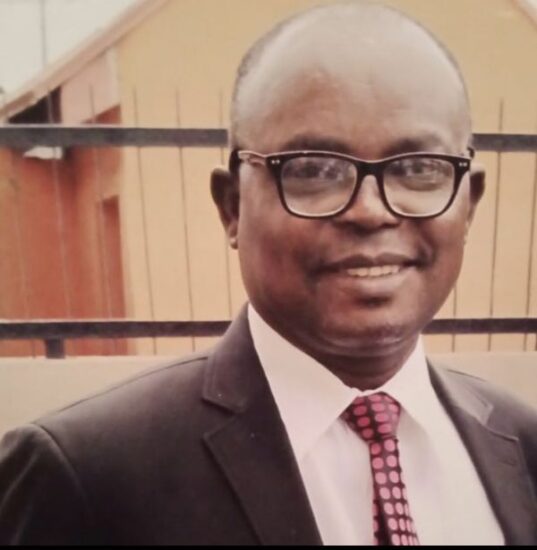
Post-Buhari
One reason many people think the recent presidential election should be put behind us as quickly as possible is because there is a lot of work to be done and distractions are the least the country requires at this point in time. The problems bedevilling the country are many and solutions, if we must state the truth, will not come easy. Another reason is that there is sufficient enough evidence from the polls to suggest who, out of the four leading presidential candidates, was preferred by the electorate, regardless how imperfect some may deem the election to have been, in truth, there are no perfect elections anywhere in the world. The positives in that election, however, override the negatives and in saner climes, those concerned would have highlighted and celebrated the positives, shade the negatives and work towards improving on the process going forward. But here we are still bugged down by allegations and counter-allegations; plots to truncate our democracy and bring back military rule or force an interim government have reportedly been uncovered; and, in all, those who think their purpose will only be served if they make the country ungovernable for the incoming president have bluntly refused to hear word, as they say. They have blatantly stuck to their guns; bent on having their way willy-nilly. In a democracy, the minority are not content with having their say but must have their way as well, to the consternation of the overwhelming majority! Their logic is warped; it is also pedantic! Their way is that of the anarchist!
READ ALSO:
- Four dead in Alabama ‘Sweet 16’ birthday party shooting
- Tension as irate youths kill one, set 64 houses ablaze in Bauchi
- Gunmen abduct Ogun traffic official on Lagos-Ibadan Expressway
- Subsidies benefit the rich, says IMF, promises to Nigeria decide
But the minority must not be allowed to hold the majority hostage. Nigerian voters have spoken and we heard them loud and clear. Their mandate they have given to Asiwaju Bola Ahmed Tinubu. In the face of the avalanche of evidence available even in the public space, going to court to press a case by the bad losers is a mere academic exercise; a face-saving measure that pales into significance when placed side-by-side what they, and the nation, stand to gain if they had been good sportsmen and statesmen of repute. Not being so, their good grief! While legal teams attend the court, the president-elect by now must be putting his team together. Policy papers must also be rolling in by now. Like I have said before, winning an election is one thing – Herculean as it might have been – governing is another kettle of fish. The special circumstances of the Tinubu/Shettima presidency will not make decisions easy to take. The Muslim/Muslim ticket is one such headache. While this may be easy to tackle as Tinubu composes his cabinet, it will be tricky when it comes to choosing the principal officers of the National Assembly. The voting pattern in the presidential election is another. The “95 percent and one percent” voter dichotomy that President Muhammadu Buhari spoke about has returned to also confront Tinubu. The South-South and South-East geo-political zones – the South-East especially – that gave the least number of votes to the president-elect are jostling for the Senate presidency and Speakership of the House of Representatives with zones that made the APC presidency possible. Reaping where they did not sow! Robbing Peter to pay Paul! I think this is the time for Northern Christians especially and Christians all over the country as a whole to stand up as one man to promote the candidacy of Northern Christians for the position of Senate President and or Speaker of the House of Representatives. But, characteristically, they are as silent as the graveyard now; they will only wake up after the deed has been done to begin to disturb our peace. They only know how to shut the stable after the horse has bolted!
By now, the president-elect ought to be consumed with finding solutions to four key problems; the first of which is insecurity. This is one problem that has cost the country a lot in human, material and capital resources. The money wasted on this could have been better utilised in other areas. The corruption witnessed in this sector under Buhari is said by some commentators to be worse than the arms bazaar of the President Goodluck Jonathan era. But how will those who have come to see the insecurity situation as their pot of soup be weaned off it? Buhari, a two-star General and one-time military Head of State, promised to tame insurgency but ended up performing woefully. Not only that, the problem got worse under his watch. Will Tinubu, a “bloody civilian”, succeed where Buhari failed spectacularly? If Tinubu fails in this sector, whatever success recorded elsewhere will only be qualified.
READ ALSO:
- APC takes 60 Senate seats, PDP 36, LP 8
- Security official alleges REC got N2bn to rig Adamawa gov poll, DSS probes
- Post-Buhari: Will Tinubu bring back the marketing boards?
Then, there is the problem of crude oil theft. Only God knows how much this country has lost, and is still losing, to this monster. This is money that should have gone into critical sectors of the economy. Unless the leakages are blocked, the bleeding will compromise whatever effort of the Tinubu administration to resuscitate and revamp the economy. Next is fuel subsidy, another drain pipe that has to be completely blocked, but will Tinubu muster the political will to remove subsidy? The Labour movement, which is a partisan of Peter Obi and his Obedients, has threatened hail and brimstones should subsidy be removed; will Tinubu call their bluff? Subsidy has to go; the local refineries must be made to work so that importation can become a thing of the past and petrol, diesel, kerosene and other petroleum products can become available locally at reasonable prices. How fast Tinubu can make this happen will be critical.
Since I grew up to differentiate my right from my left, I have heard it said ad nauseam and ad infinitum that Nigeria would diversify its economy but the economy still remains largely mono-cultural, depending on the sale of crude oil. We have played lip service to plans, policies and promises to return agriculture to its hitherto pride of place and develop the non-oil sector. Before the discovery of oil in commercial quantity at Oloibiri in 1956 (and production of crude oil began the next year), agriculture was the mainstay of Nigeria’s economy. We had groundnuts, hides and skins, cocoa, coffee, timber, coal, palm oil, and the likes. We were also self-sufficient in food crops production. Largely, we consumed what we produced but when crude oil dollars flowed in, we abandoned agriculture and our taste buds took interest in anything and everything foreign. That was where the rain started beating us. When we talk of structural transformations that Nigeria needs to survive and flourish again, we mean two things: Restructuring of the country and diversification of the economy. It bears repeating again that if Tinubu paves all Nigerian roads with gold and puts dollars in everyone’s pockets but fails to do these two, he would have failed ab initio.
We must bring the groundnut pyramids back. Cocoa must return to its pride of place. We must reclaim our seat as leaders in palm oil production and lots more. We must retrieve positions we lost to countries like Ghana, Cote d’Ivoire, Malaysia and others. The in-coming administration must actively promote the production of cash crops for exports and we must add value to whatever we produce locally. We need to earn more foreign exchange and consume less of imported goods and services. Knowledgeable Nigerians will tell you that Nigeria is actually not a rich country but we have the potential to be rich and much of this potential lies in agriculture – and mining – which we have left largely untapped, focussing all attention on rents collected on crude oil exploitation by foreign multinational companies.
READ ALSO:
- Dino Melaye wins Kogi PDP governorship ticket
- Rwanda Police recovers over Rwf4 million stolen from British national
- Breaking: First Nigeria’s woman governor emerges as INEC declares Binani winner in Adamawa
A controversy loading at the moment is whether we should maintain the free market policy of farmers selling their commodities in the open market or the government should bring back the days of the agricultural marketing boards. Cross Rivers State Gov. Ben Ayade is leading the agitation for a return of the marketing boards while the Federation of Agricultural Commodity Association of Nigeria (FACAN) opposes the move. Last December, the FACAN president, Dr. Victor Iyama, decried a return of the marketing boards, saying it would be counter-productive as it would amount to an ill-wind that would not blow any of the stakeholders any good. Comparing Nigerian cocoa farmers with their Ghanaian counterparts where marketing boards are in operation, Iyama said at a press briefing that the Nigerian farmers fare better. Marketing Boards, he said, short-changes farmers and discourages direct foreign investment.
The present controversy would have been unnecessary had the government followed through with its plans and policies.
In 2017, the then Minister of Agriculture, Audu Ogbeh, had promised that the Federal Government would organise a national debate on whether or not to re-introduce agricultural marketing boards. He was reported extensively in the media; one of the reports went thus: “The Federal Government says it is planning a national dialogue to consider the re-establishment of marketing boards. The Minister of Agriculture, Audu Ogbeh, disclosed the plan in an interview with the News Agency of Nigeria, NAN, in Abuja… Mr. Ogbeh, who was speaking on the country’s 57th Independence anniversary, said that although marketing boards facilitated exportation of agricultural produce in the past, there was the need for stakeholders to deliberate on their revival. He said the dialogue would enable agriculture stakeholders to discuss and analyse the impact and challenges of the boards during its operation with a view to deciding whether or not to re-establish them. The minister noted that the boards, while in existence, ensured that exported agricultural produce were not rejected at the international markets as they met the required standards and quality.”
Audu was further quoted as saying: “About two months ago, we met in my office with the Chairman, Senate Committee on Agriculture. We wanted to hold a major national discussion on this matter to know whether we should go back to the marketing boards. They (marketing Board) were people who taught farmers how to grow things, how to harvest, how to dry them to meet international standards. They went round villages telling farmers what to do, what not to do, how to do it and they would buy the crops, organise a ship for exports. They were abolished in 1974 under the military and, since then, there was only one attempt to replace the marketing boards with the commodity companies but they never functioned. People are saying we should introduce the commodity exchange but I do not want the ministry to wake up and say we are going back to this. I want Nigerians who know about it to come out and talk. There are those who said that the marketing boards were abused and their major operators defrauded farmers but there are those who said that it was because they were abolished that agriculture declined. We want to debate it, let’s make decisions together’’.
It is unfortunate that the planned debate never took place but now is the time for it! The Tinubu administration must put agriculture on the front burner. With the unemployment rate climbing dangerously towards 40 percent with most of this figure being able-bodied youths, many of whom have passed out of college with no job in sight; agriculture holds the prospects of providing gainful employment for this critical mass of the nation’s burgeoning population. The time to act is now! We welcome readers’ reaction to this very important topic! Let the debate begin in earnest!
*Former Editor of PUNCH newspapers, Chairman of its Editorial Board and Deputy Editor-in-chief, BOLAWOLE was also the Managing Director/ Editor-in-chief of THE WESTERNER newsmagazine. He writes the ON THE LORD’S DAY column in the Sunday Tribune and TREASURES column in New Telegraph newspaper on Wednesdays. He is also a public affairs analyst on radio and television.
By Bolanle Bolawole turnpot@gmail.com 0705 263 1058
Post-Buhari: Will Tinubu bring back the marketing boards?
Opinion
Tinubu as yesterday’s rebel and today’s tyrant, By Farooq Kperogi

Tinubu as yesterday’s rebel and today’s tyrant, By Farooq Kperogi
President Bola Ahmed Tinubu’s demonstrably unconstitutional suspension of the elected leaders of Rivers State and his illegal imposition of a retired military lickspittle as sole administrator in the exercise of his otherwise constitutional privilege to declare a state of emergency in any part of the country is the latest addition in a long list of instances of his embrace of the very things he once resented and fought against when he was outside the reins of federal power.
For example, he was brutally censorious of Goodluck Jonathan’s withdrawal of fuel subsidies in 2012. He expressed sentiments in writing and in speeches that resonated with the angst of the masses. He even helped finance a nationwide mass protest that so convulsed the country that Jonathan was compelled to back off his plans.
Yet, one of the first acts Tinubu did as a president in May 2023 was to announce an economically and socially disruptive withdrawal of fuel subsidies that has deepened poverty, annihilated the middle class, and ruptured the very fabric of Nigerian society.
Again, when Olusegun Obasanjo unconstitutionally suspended Plateau State’s Governor Joshua Dariye—along with state legislators— in May 2004 and appointed General Chris Ali as the state’s sole administrator, then Governor Bola Ahmed Tinubu of Lagos rightly called the act “illegal.”
“It is unfortunate and illegal,” he said. “This has to be discouraged. It is a bad precedent. What the president of the country has done, I pray it doesn’t stand.”
In fact, when Goodluck Jonathan declared states of emergency in the three northeastern states of Borno, Yobe, and Adamawa without suspending the elected leaders of the states, which I commended in a May 25, 2013, column titled “The Malcolm Xian Logic in Jonathan’s Praiseworthy Boko Haram Offensive,” Tinubu condemned it as unacceptable federal overreach.
READ ALSO:
- Communal Clash: Gov Adeleke imposes new curfew on Ifon, Ilobu communities
- BREAKING: IGP redeploys 38 police commissioners
- Osimhen breaks Odegbami’s Eagles goal record
“No governor of a state in Nigeria is the chief security officer,” he said. “Putting the blame on the governors, who have been effectively emasculated, for the abysmal performance of the government at the centre which controls all these security agencies, smacks of ignorance and mischief.”
He contended that Jonathan’s action “seeks to abridge or has the potential of totally scuttling the constitutional functions of governors and other elected representatives of the people” and that it would be “counterproductive in the long run.”
Given an opportunity to give materiality to the principles he espoused when he had no access to federal power, he has become indistinguishable from, and in many cases worse than, the objects of his erstwhile censure.
Tinubu now implements the same policies he once condemned and has become the same personality he once reviled. He exemplifies the aphoristic wisdom (often attributed to historian Ariel Durant or her husband Will Durant) that says, “Today’s rebel is tomorrow’s tyrant.” In Tinubu’s case, he was yesterday’s rebel and today’s tyrant.
Why do most people who initially invested symbolic and political capital in fighting against authority or oppression eventually become the very oppressors they once resisted? Why do firebrands and idealists often morph into the very thing they once denounced after assuming power?
The evidence of history shows us that resistance to tyranny can, and often does, end in new tyrannies. Critics of war or corruption frequently adopt those same practices when they find themselves in the circles of power.
So, this is beyond Tinubu as a person, who probably never really had any principles to begin with, whose resistance to past oppressive policies was probably mere calculative opportunism.
But why do previously genuinely adversarial people become the very things they once opposed with such regularity? Observers from psychology, philosophy, and political theory have long studied this phenomenon.
A previous column I wrote (and republished twice) on the psychology of power pointed out that “people under the influence of power are neurologically similar to people who suffer traumatic brain injury” and posited that situational, power-induced brain damage may be responsible for this.
READ ALSO:
- 2026 WCQ: Super Eagles move up to third place with 2-0 win in Rwanda
- Nnamdi Kanu returns to court, apologises over attacks on judge, others
- Binance delists five cryptocurrencies
Philosophers have also grappled with the paradox of noble ideals curdling into oppression. Friedrich Nietzsche, for example, famously warned of the moral danger that comes with fighting evil too intensely. “He who fights with monsters should look to it that he himself does not become a monster,” Nietzsche wrote, adding, “if you gaze for long into an abyss, the abyss gazes also into you.”
Nietzsche’s metaphor speaks to how the struggle for power or justice can warp people’s souls. Revolutionaries and reformers, in attempting to vanquish a “monster” (e.g. a tyrant or an unjust system), may take on the very methods and mindset of that monster.
His concept of the “will to power” also suggests that the drive to attain power can override other moral constraints, so that once the will to power is unleashed, individuals rationalize actions that serve dominance.
French theorist Michel Foucault provides another lens through which we can make sense of the phenomenon of people taking on the very methods and mindset of the beasts of power they once fought.
He said, “Power is everywhere; not because it embraces everything, but because it comes from everywhere.” By that, he means no one is ever truly outside power relations; even the most vicious critics of the most monstrous regimes operate within a field of power. Once the critics take control, he said, they often reproduce the very power dynamics they once criticized, even if their rhetoric changes.
The line between oppressor and liberator can blur: the roles may switch, but the play remains the same. Foucault’s insight is that systems of power tend to self-perpetuate, regardless of who is at the helm, unless conscious effort is made to dismantle those underlying structures.
In other words, a change in leadership without a change in what Foucault calls the “microphysics of power” is likely to yield similar repressive outcomes. The new boss becomes “same as the old boss,” because the circuitry of power channels them into that role.
That’s why the sadly familiar pattern of “condemning in opposition, then doing in government” is so widespread that it almost seems like a political law of gravity. It’s good to bear this in mind as we read and listen to the pronouncements of current “opposition” politicians who seem like they identify with popular causes and sentiments.
READ ALSO>:
- Akpabio told me I’d make good movements with my waist – Natasha
- Supreme Court declares Wike’s ally Anyanwu as PDP National Secretary
- Why we want Natasha out of Senate – Kogi Central constituents
Like Tinubu, today’s opponents of executive overreach may extend their own executive powers once they have the opportunity.
Like Tinubu, they will have a story to tell themselves and the public to justify their U-turn: the situation is different, their actions are for the greater good, their previous stance was based on incomplete information, etc. And indeed, sometimes circumstances do legitimately change.
But when the dust settles, the outcome looks awfully familiar. Pro-democracy activists become a congress of tyrants and justifiers of tyranny; the fierce social critic and human rights activist who once decried abuses now defends them; the liberator who once raged against oppressors now only liberates his stomach. As the Roman philosopher-politician Cicero once wrote, “It is easier to criticize than to do better.”
Fortunately, this cycle is not inevitable. Many thinkers advocate checks and balances, institutional limits, and personal integrity as antidotes, although even those seem to be insufficient.
Nigeria’s National Assembly, as we have seen in the last few years, particularly in the last few days, can neither check nor balance the excesses of the executive. It’s a slavish extension of Aso Rock. The voices of the few honest, conscientious ones among them are drowned out by the cacophony that the rapacious, unprincipled, mercenary self-seekers among them, who constitute the majority, emit. The judiciary is even worse.
It is easy to be disillusioned and to surrender amid this reality. To be frank, I have found myself in that state many times. But power must be continually guarded and checked. Philosopher Hannah Arendt observed that only constant vigilance and a commitment to plurality and law prevent rebels from calcifying into tyrants.
We must all do our part to hold people in power to account, even if we’re not sure we would do better ourselves. At this point, the only check and balance against creeping tyranny is the democratic rebellion of the people.
Tinubu as yesterday’s rebel and today’s tyrant, By Farooq Kperogi
Farooq Kperogi is a renowned columnist and United States-based Professor of journalism.
Opinion
Rivers State emergency rule: A different view by Azu Ishiekwene
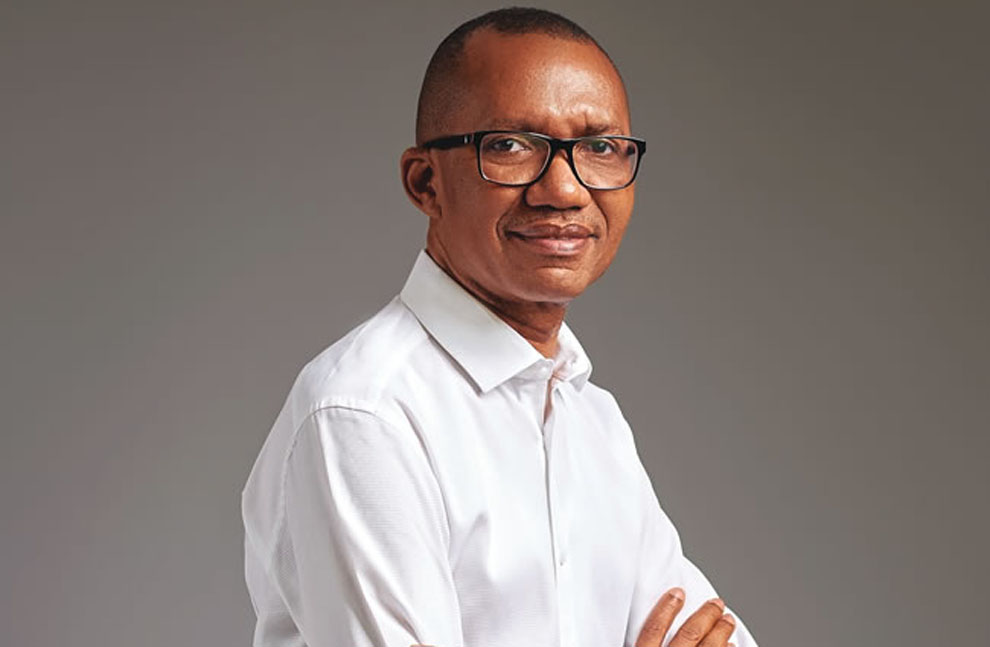
Rivers State emergency rule: A different view by Azu Ishiekwene
President Bola Ahmed Tinubu’s proclamation of emergency rule in Rivers State on Tuesday surprised me for reasons different from those for which he has been severely criticised.
The mildest criticism is that Tinubu’s failure to call the Minister of the Federal Capital Territory, Nyesom Wike, to order was responsible for the crisis.
The more severe criticisms range from accusations that the President has subverted constitutional rule to charges of potential destabilisation at the behest of Wike.
A common point of agreement is that a civilian president should never have to declare emergency rule. That is the ideal.
But Rivers State before Tuesday presented a dire and complicated situation that stretched idealism to its elastic limits.
Chaos in slow motion
It’s convenient, especially for those who promoted and profited from the crisis, to pretend otherwise. Still, after the 27 state lawmakers loyal to Wike issued an impeachment notice, the outcome, if Governor Siminalayi Fubara had been impeached, might have been far worse for the state than can be contemplated under emergency rule. The proclamation was an unsolicited stitch in time.
If oil pipelines were already being blown up and militants deploying as the impeachment notice reached Fubara, what would have happened if the process had carried through? Rivers State has been chaos in slow motion for nearly two years, the only thriving business in the state being the politics of those who support Fubara and those who are against Wike.
The Supreme Court’s judgement invalidated the budget passed by Fubara and nullified the local government election. It affirmed the position of the 27 lawmakers, making Fubara’s government a lame duck. Emergency rule saved the governor from gunpoint, created a pause for the people to get their lives back, and made room for Wike and Fubara to stop and reflect. It’s a messy situation, but the counterfactual could have been worse.
READ ALSO:
- How Wande Abimbola rejected IBB’s ING bait, and other stories (1)
- Soldiers arrest 16 suspected oil thieves in Port Harcourt
- Controversial singer Portable apologises to Saheed Osupa over copyright dispute
Between Wike and Fubara
Popular media has framed Fubara as the victim of a grasping, unforgiving godfather, which suits his comportment. But during this inconvenient pause, it might be helpful for the governor to reflect on what he might have done differently, something that pressure by those egging him on for their narrow, selfish reasons might not have given him the space to do
President Bola Ahmed Tinubu’s proclamation of emergency rule in Rivers State on Tuesday surprised me for reasons different from those for which he has been severely criticised.
The mildest criticism is that Tinubu’s failure to call the Minister of the Federal Capital Territory, Nyesom Wike, to order was responsible for the crisis. The more severe criticisms range from accusations that the president has subverted constitutional rule to charges of potential destabilisation at the behest of Wike.
A common point of agreement is that a civilian president should never have to declare emergency rule. That is the ideal. But Rivers State before Tuesday presented a dire and complicated situation that stretched idealism to its elastic limits.
Chaos In Slow Motion
It’s convenient, especially for those who promoted and profited from the crisis, to pretend otherwise. Still, after the 27 state lawmakers loyal to Wike issued an impeachment notice, the outcome, if Governor Siminalayi Fubara had been impeached, might have been far worse for the state than can be contemplated under emergency rule. The proclamation was an unsolicited stitch in time.
If oil pipelines were already being blown up and militants deploying, as the impeachment notice reached Fubara, what would have happened if the process had been carried through? Rivers State has been chaos in slow motion for nearly two years, the only thriving business in the state being the politics of those who support Fubara and those who are against Wike.
READ ALSO:
- Bandits strike again in Benue, gun down 2 soldiers, 3 others
- UK announces new passport application fees starting April 2025
- Court lifts order stopping Senate probe on Natasha Akpoti
The Supreme Court’s judgment invalidated the budget passed by Fubara and nullified the local government election. It affirmed the position of the 27 lawmakers, making Fubara’s government a lame duck. Emergency rule saved the governor from gunpoint, created a pause for the people to get their lives back, and made room for Wike and Fubara to stop and reflect. It’s a messy situation, but the counterfactual could have been worse.
Between Wike and Fubara
Popular media has framed Fubara as the victim of a grasping, unforgiving godfather, which suits his comportment. But during this inconvenient pause, it might be helpful for the governor to reflect on what he might have done differently, something that pressure by those egging him on for their narrow, selfish reasons might not have given him the space to do.
In the public imagination, control of the state’s “political structure” is at the heart of the dispute between Fubara and Wike. Whether that is so, whether it’s about who the “authentic” party leader is, or it is more than what the public knows, Fubara and Wike know. We can only guess. But they both know.
Open War
The open war started after Fubara’s swearing-in when the governor wanted to install his candidate as speaker in the House of Assembly but failed. What was the point of demolishing the State House of Assembly complex built with hundreds of millions of naira of taxpayers’ money in December 2023 simply on the suspicion that the lawmakers were planning to impeach him there? Why did the governor think it was right to convene four of 31 lawmakers in his office to present the appropriation bill and then go on to implement it?
And why, after the peace deal brokered in Abuja, was it difficult for him to be his own man, free himself as the hostage of opportunistic local politicians and self-appointed opinion leaders and implement the decisions reached, instead of caving into busybodies in the People’s Democratic Party (PDP) whose primary interest is to continue the unfinished war of the 2022 Convention by other means?
Atiku could not have forgotten that when his boss did it again in Ekiti State two years later, it was mainly to facilitate Obasanjo’s hijack of the state for his political convenience, after lawmakers claimed to have impeached the governor. Fayose had become a thorn in his side, and he vowed to remove him by all means, fair and foul… Atiku may argue that he had been estranged from the government then and could not bear vicarious liability. However, he remained a part of the government until the end and must endure its glory and shame.
READ ALSO:
- Mohbad’s brother, Adura, arrested by police in Lagos
- UN staff member killed in central Gaza blast, five others injured
- Air Peace slashes Nigeria-London fare by N600,000
Atiku No 2 .
The PDP leadership and their cousins in Labour have never forgiven Wike for supporting Tinubu’s election. They have been quite loud in condemning the state of emergency. That’s their job as opposition. However, if the PDP is letting its testosterone rush get into its head and impair memory, we may need to remind the party how we got here.
Former Vice President Atiku Abubakar has been quite vocal in condemning emergency rule in Rivers State. In his earnestness, he has forgotten that the government in which he was the Number Two man had a shambolic record of infidelity to constitutional rule. And that is saying it nicely.
One can argue that President Olusegun Obasanjo’s proclamation of emergency rule in Plateau State in 2004, though controversial, was inevitable because of the horrific deaths caused by the sectarian violence, which led to reprisals in other states. Yet, former Governor Joshua Dariye’s suspected links to the crisis made his suspension inevitable.
Bayelsa’s Playbook!
Atiku could not have forgotten that when his boss did it again in Ekiti State two years later, it was mainly to facilitate Obasanjo’s hijack of the state for his political convenience, after lawmakers claimed to have impeached the governor. Fayose had become a thorn in his side, and he vowed to remove him by all means, fair and foul.
Atiku may argue that he had been estranged from the government then and could not bear vicarious liability. However, he remained a part of the government until the end and must endure its glory and shame.
Or perhaps he would have preferred the impeachment of Fubara from Obasanjo’s Bayelsa playbook? In that case, instead of an emergency rule, Tinubu would have provided a haven where the majority 27 lawmakers would have met under heavy security protection to remove the governor, as Obasanjo did under slightly different circumstances, in the case of former Governor Diepreye Alamieyeseigha.
Amaechi’s Forgotten Diary
Former Rivers State Governor Rotimi Amaechi, a longstanding foe of Wike, also weighed in, condemning the “power grab’s illegality.” He has a right to intervene and speak his mind. However, since he called the proclamation “an affront” to the rule of law and a power grab, it might be helpful to remind him of a typical, but by no means isolated, example from his record as governor.
The underlying currents may be similar – local politics gone rogue – but the consequences or potential consequences are not. Constitutional lawyers can debate the legal triggers because of the lack of clarity in Section 305 of the 1999 Constitution, compared with the 1960 Constitution, a pre-Republican document that gave the prime minister more expansive powers.
In 2013, when the position of chief judge in Rivers State was vacant, Amaechi appointed and swore in the president of the Customary Court of Appeal, Justice Peter Agumagu, against decency and the provisions of law. He joined issues with the National Judicial Commission (NJC), which was at its wit’s end to restrain him and keep him on the path of common sense. The state judiciary reeled under Amaechi’s blatant affront for one year, which he now conveniently forgets.
Apples and Oranges
Parallels have been drawn between the state of emergency in Rivers State and the one in 1962 during the Western Region crisis, especially as the latter was believed to have led the country down the slippery slope that eventually ended in the removal of the Tafawa Balewa government and the Civil War.
The underlying currents may be similar – local politics gone rogue – but the consequences or potential consequences are not. Constitutional lawyers can debate the legal triggers because of the lack of clarity in Section 305 of the 1999 Constitution, compared with the 1960 Constitution, a pre-Republican document that gave the prime minister more expansive powers.
While the emergency rule in the Western Region was mainly an opportunistic intervention by the federal government to undermine the Obafemi Awolowo-led opposition, the emergency in Rivers State was an inevitable step to prevent a potential descent into chaos, where the governor was not an innocent bystander.
Water in the Coconut
Since 1999, two administrations – Muhammadu Buhari’s and Umaru Yar’Adua’s being the only exceptions – have proclaimed emergency rule. Apart from 2013, when President Goodluck Jonathan left the governors of the three affected states in place because they had no link to the crises in their states, complicity has affected the scope of the application of emergency rule.
When Obasanjo threatened an emergency in Lagos, Tinubu said it was unacceptable because he was doing his best as governor to tackle the sectarian clashes in a small part of the state then. In Rivers, the governor is a part of the problem.
Those opposed to the proclamation should say how to leave Fubara in place and extract the water of peace from the coconut of Rivers State without breaking the shell on the head of the people.
Rivers State emergency rule: A different view by Azu Ishiekwene
Opinion
How Wande Abimbola rejected IBB’s ING bait, and other stories (1)

How Wande Abimbola rejected IBB’s ING bait, and other stories (1)
Tunde Odesola
(Published in The PUNCH, on Friday, March 21, 2025)
Embarrassment has no truer depiction than the guilt a debtor feels each time the string of his indebtedness twangs at his soul. I am talking about an honest debtor here. A sincere debtor feels sad whenever his inability to mend his broken promises nudges his conscience. He sincerely wishes to pay but cannot, yet.
However, the insincere debtor, hard like the shell of a tortoise, is unperturbed whenever he remembers his empty repayment promises. He blinks like a toad on a full stomach, “My lender knows times are hard. I cannot come and kill myself, jare. I will pay someday,” he says with malicious arrogance.
Despite living in a cutthroat world of credit facilities, I dislike borrowing. However, due to banking bottlenecks, I occasionally need a quick loan. When this arises, my mind will never be at rest until I pay it off. Whenever I’m indebted, the chiefest of my prayer points will be the grace not to die suddenly so I can pay up my debt and not carry someone’s money to the grave.
I always say this to my lender, “Uhmm, if I die today and you start crying, people will think you are crying for me, they won’t know you are crying for your money. You would come to my wake, look at my corpse and say in your mind, ‘Look at his big head! He has carried my money to heaven, idiot!’”
My lender would laugh and say, “Ha, you are not serious. You are not going to die now. Do not talk like that!”
But I talk like that because I know death lurks in the shadow of every mortal. I know each minute is a gift; each breath – a favour.
A jolly good friend of mine, Idowu Bailey, was born on Wednesday, November 14. Last month, Bailey, a giant, danced at a wedding anniversary shindig on a Saturday, visited his mechanic on Tuesday, spoke with a friend on Wednesday, and on Thursday, he died in the parking lot of his workplace, right inside the car with which his wife had taken him to work. Born in 1962, Bailey was 62 when he died. Bailey had a good heart and left a good impression of himself on everyone.
READ ALSO:
- Soldiers arrest 16 suspected oil thieves in Port Harcourt
- Controversial singer Portable apologises to Saheed Osupa over copyright dispute
- Bandits strike again in Benue, gun down 2 soldiers, 3 others
When he noticed our church pastor, Mr Peter Oyediran, had chosen the ‘Gorimapa’ hairstyle, which leaves no strand of hair on the head, Bailey presented a new set of clippers to the cleric, saying, “I observed you keep no hairs on your head nowadays. Here is a good set of clippers, sir.”
Debt. Since January last year, I have looked forward to writing a sequel to the series, “Wande Abimbola @ 91: How an àbíkú decided to live”, which I started in honour of the exemplary life of a former Vice Chancellor, Obafemi Awolowo University, Ile-Ife.
The series was a debt I felt I owed to the integrity, dedication, courage and excellence that define the grass-to-grace story of a village boy, who rose from the relics of the ancient Oyo Empire to peak at the academic mountains of Harvard University, Boston University, Amherst College, University of Louisville, Kentucky; Colgate University, Smith College, Massachusetts; and Great Ife, among others.
But I could not bring myself to do a follow-up on my series on Abimbola because Nigeria is a land of ‘one week, plenty troubles’. And, to remain in touch with readers, a columnist’s commentaries should sync with current affairs and realities.
Here’s a rundown of my articles between November last year and March, this year: the nation woke up to a member of the House of Representatives, Alex Ikwechegh, dehumanising and threatening to make a taxi driver disappear. A few days after this, a violence-encouraging video of the Alapomu of Apomu, Oba Kayode Afolabi, surfaced online, charging some members of the Peoples Democratic Party to take up arms during an election. Days apart, the story of Godwin Emefiele’s alleged 753-duplex estate broke, then Dele Farotimi wrote a book, and the Timi of Ede knelt to the Emir of Ilorin.
Along the way came the king of Orile-Ifo, Oba Abdulsemiu Ogunjobi, who threatened a 73-year-old man, Pa Arinola Abraham, with death. Later, IBB sold the most dishonest autobiography of all time. Then Bola Tinubu’s Lagos State House of Assembully replaced democracy with tyranny just before Senator Natasha Akpoti-Uduaghan dragged Senate President, Godswill Akpabio, to the virtual superhighway, accusing him of tailgating.
Each week I tried to go back to the Wande Abimbola story, a calamitous story broke in Naija. Just this week, a state of emergency was foisted on Rivers State by the Asiwaju of Nigeria.
Since life is but a walking shadow and Baba Abimbola is 92, I pushed the pause button on my editorial desk to celebrate the Awise while he is alive. More so, President Tinubu breathed a six-month lifespan into the nostrils of the emergency rule in Rivers, so I have enough time to come back and paddle my canoe on the Rivers of turbulence.
This series is a further exploration of Abimbola’s phenomenon as a beacon of good leadership, transparency in public office and religious fidelity.
READ ALSO:
- UK announces new passport application fees starting April 2025
- Court lifts order stopping Senate probe on Natasha Akpoti
- Mohbad’s brother, Adura, arrested by police in Lagos
To different people, Abimbola means different things. While many foreign religion worshippers call him a pagan, he is a hero to traditional religion adherents. Wande, the only surviving son of Iroko Abimbola, has spoken at the conclaves of world religious leaders, which included the Pope, upholding the truth of Ifa and radiating the essence of Yoruba culture and tradition.
Abimbola and the late MKO Abiola shared one thing in common. Both are abikus. “I am an abiku, who decided to stay after five comings. Abiola came 23 times before he chose to live.”
Abimbola and MKO met in the late 1960s at the Staff School of the University of Lagos. “I joined UNILAG as a senior research fellow in 1966 and I enrolled my children at the staff school. I took them to and fro the school. Abiola too was doing the same thing for his two children – Kola and his sibling. In the afternoon, we both got there before the school closed. It was while waiting for the school to close that we got talking. Abiola was an accountant with the International Telephone and Telegraph Corp,” the Awise Agbaye began.
He continued, “Abiola was a most jovial friend. He regularly visited me at my UNILAG house on Bode Thomas Street in Surulere, Lagos. When he comes, he would say, “Bàbá Àgbà, óò dè ní yòdí, óò dè ní béèrè énìkankan, óò dè je ka sere lo…,” exhorting me for not asking of him and urging me to let us go and hang out.
“Abiola told me he came from a very poor background and had to play a stringed musical instrument called ‘Osugbo’ to fend for himself. He loved me and I loved him, too. In 1972, I left UNILAG and went to Ife as a senior research fellow, so we lost contact temporarily. It was later, I began to read about him in newspapers and I began to wonder if it was the same Abiola who was my friend. One day, he sent an invite to me for the christening of his child. So, I went, and we reunited.
READ ALSO:
- UN staff member killed in central Gaza blast, five others injured
- Air Peace slashes Nigeria-London fare by N600,000
- Tinubu’s state of emergency prevented Fubara from impeachment – AGF
“I soon became the vice chancellor, and he would visit me for three or four days. His convoy would come late into the night, and I would lodge him in the chancellor’s lodge, which was behind my lodge. Anytime he visited, the domestic staff knew they had hit a jackpot because he would give them a huge sum of money that they all would share. After sharing, each worker would get as much as N5,000 when their salary was less than N200,” Abimbola said.
After the world-acclaimed scholar finished his two-term tenure of seven years as V-C (1982-1989), he tried his hands in politics, emerging a senatorial candidate of the Social Democratic Party in Oyo State after he was rigged out of the governorship race, which he said he won. Abimbola said the late Strong Man of Ibadan politics, Alhaji Lamidi Adedibu, and some other Oyo political leaders appeased him with a senatorial ticket. “They said they knew I won the primary but that they want an Ibadan son, Kolapo Ishola, to be the governor. After consultations with my people in Oyo, I accepted and worked for Ishola in Oyo.”
Abimbola won his senatorial election by a landslide. When the National Assembly convened, he emerged as the Senate Majority Leader, making him a leading Yoruba voice in national politics at the time.
No sooner had the Senate convened than the majority leader attracted enemies to himself when he single-handedly repelled the move by senators to determine and approve their salaries.
It was also in his direction that the Ibrahim Babangida military junta first looked when searching for who would head the Interim National Government – after annulling the June 12, 1993, presidential election won by Chief MKO Abiola.
“I was contacted twice to come and head the Interim National Government. I think they chose me because I was the highest-ranking Yoruba political office holder then. They probably thought if they chose me, that would assuage the feelings of the Yoruba. Four reasons made me reject the offer,” Abimbola said.
To be continued.
Email: tundeodes2003@yahoo.com
Facebook: @Tunde Odesola
X: @Tunde_Odesola
How Wande Abimbola rejected IBB’s ING bait, and other stories (1)
-
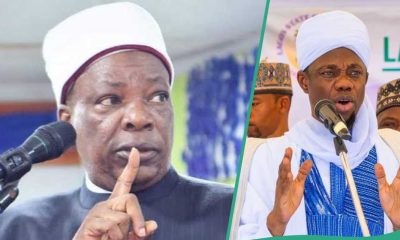
 metro2 days ago
metro2 days agoAttack on Mufty of Ilorin: Onikijipa Family Charges Stakeholders to Call Sheikh Habibullahi Al-Ilory to Order
-

 Health2 days ago
Health2 days agoNigerian doctor pioneers W’Africa first robotic prostate cancer surgery
-
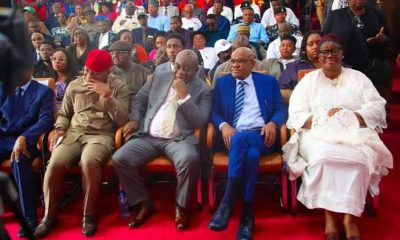
 metro2 days ago
metro2 days agoFubara: Supreme Court reacts to photo of Justice Agim with Wike
-
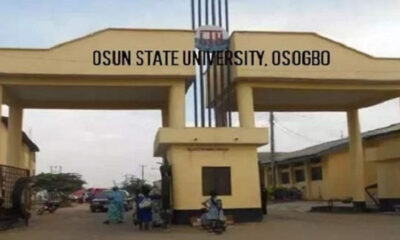
 metro2 days ago
metro2 days agoUNIOSUN mourns as 5 students die in auto crash
-

 metro1 day ago
metro1 day agoHow ritualists, native doctor drugged, murdered underage sisters in PH – Police
-

 International1 day ago
International1 day agoCanada removes bonus ranking points for job offers in Express Entry system
-

 metro7 hours ago
metro7 hours agoJUST-IN: Ex-Oyo gov Ajimobi’s first child Bisola dies At 42
-
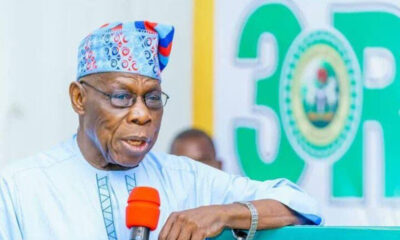
 metro2 days ago
metro2 days agoAgain Obasanjo accuses federal lawmakers of bribery







